Luvo Manyonga
Olympic hero Luvo Manyonga captured South Africa’s first medal at the IAAF World Championships in London – a long jump gold medal. The achievement follows the silver he won at the Rio Olympics last year.
Before the glory, sports writer Luke Alfred helped tell his story of how he ditched drugs and reclaimed his mojo.
When I last met long jumper Luvo Manyonga a little over a year ago, he was half-heartedly weaving together the strands of a badly fraying life. Domestic existence was ropey and his coach had just died in a car accident; tik was cutting a swath through Mbekweni, the township outside Paarl in which he lived, and he was watching buddies fall like skittles – victims of the endemic gun crime that lubricates the drug wars over turf and market share.
Despite the horror and the drift, he became vaguely aware that, had he taken a different route home or been standing at a different angle in a pool of light, the victim could have been him. Given his talent, it seemed a waste to be another senseless murder in the Western Cape’s rampant shantytowns, which now contain about half a million users of tik.
More to the point, Manyonga wasn’t jumping. He was left out of the South African team for the Commonwealth Games in Glasgow last year on a trumped-up technicality – we mislaid his papers, murmured the sport’s umbrella body, the South African Sports Confederation and Olympic Committee (Sascoc) – and spent the remaining months of last year caged and tempted.
His mentors, John McGrath, the Irish rower, gym owner and Coney Island strongman performer, and Ryk Neethling, the former Olympic swimmer, strongly considered flying him to Cuba. They pointed out that Cuba was as far away from the tik havens of Mbekweni as it was possible to be, and rounded off their argument by emphasising Cuba’s proud tradition of quality long jumpers. They knew, for example, that Ivan Pedroso, who won long-jump gold at the Sydney Olympics in 2000 with a distance of 8.55m, was keen to take Manyonga under his wing. A mercy mission to the Caribbean under the cover of darkness was the way to go.
It didn’t happen. There was a snarl-up in the processing of visas and problems with money and responsibility. Instead, Gideon Sam, the head of Sascoc, belatedly stepped in from the shadows. He suggested that Manyonga spend the year at Pretoria University (Tukkies), training at its high-performance centre. He could live in a communal house with other potential Olympic athletes and dry out while trying to crack the qualifying distance for next year’s Rio Olympics.
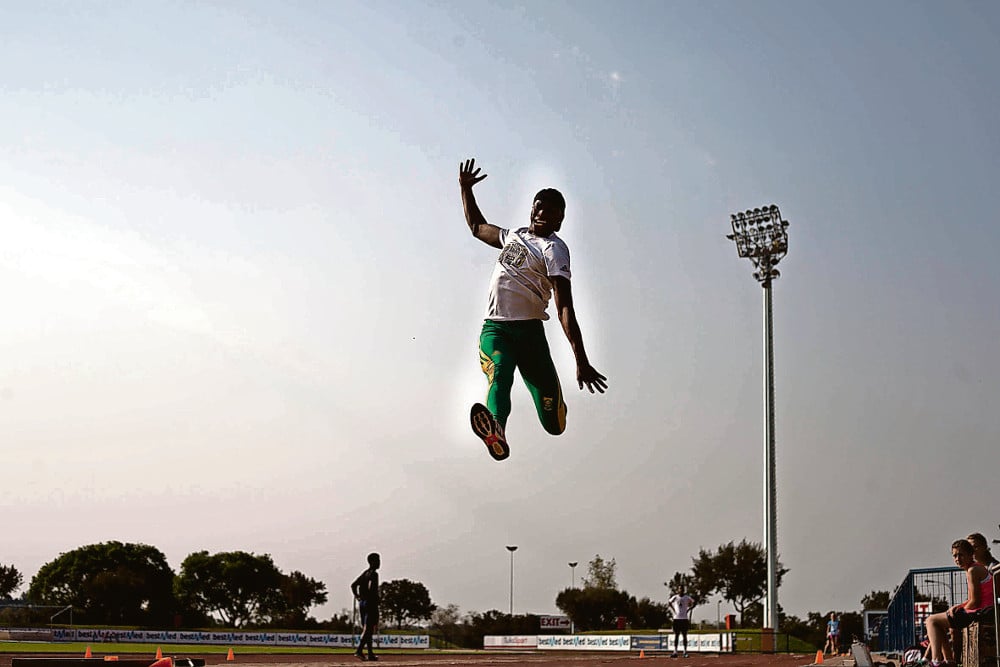
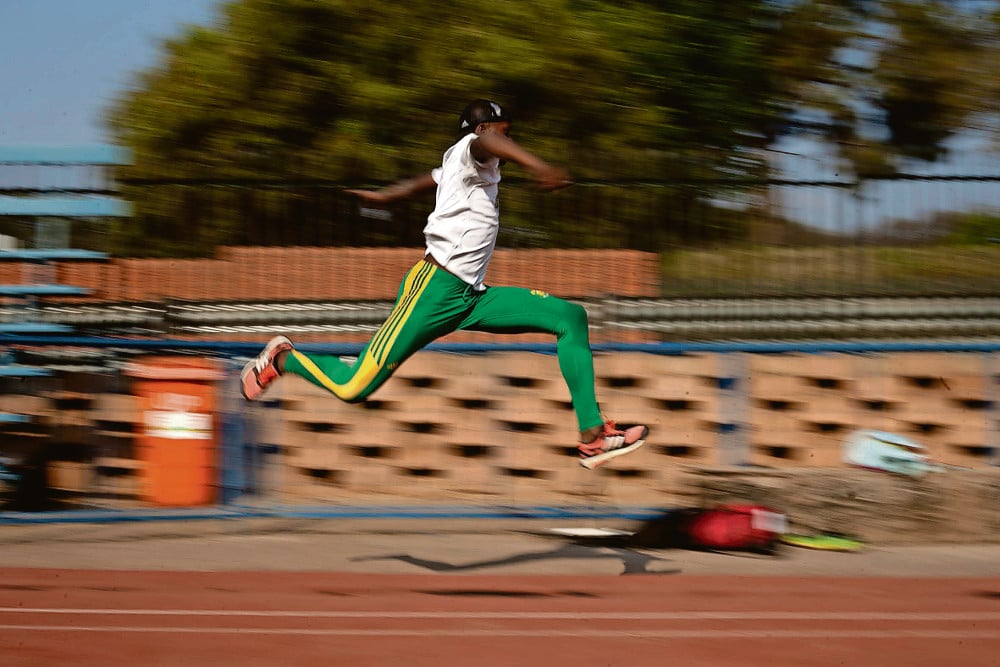
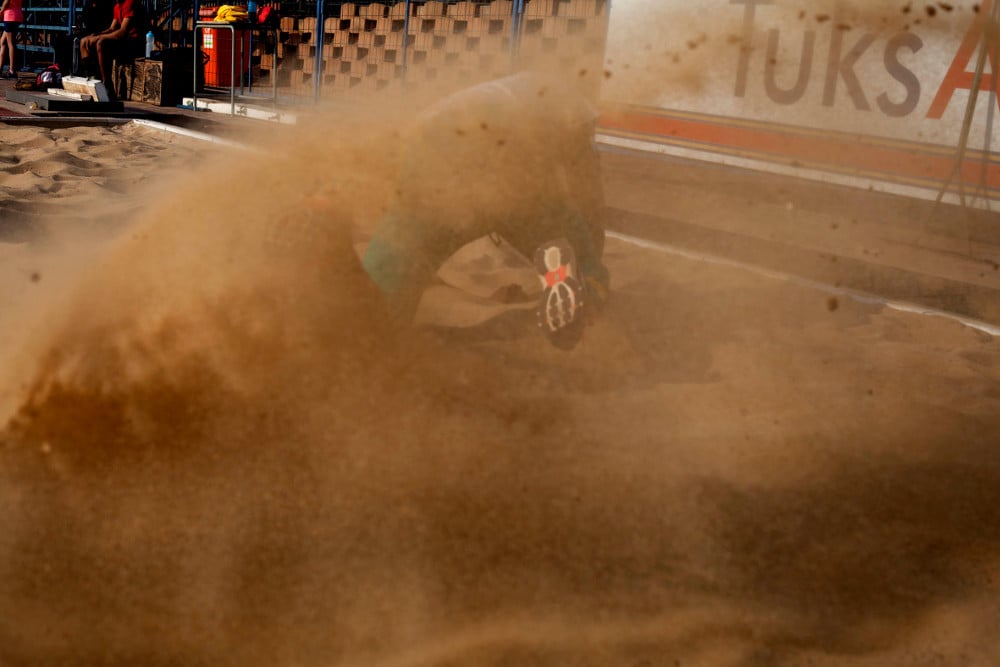
Luvo Manyonga wants to increase his speed and bring down his weight to go faster and further. (Oupa Nkosi, M&G)
Manyonga has now been clean for six months. After training three times a day and talking shit with his communal colleagues, texting the honeys that swarm around his pot, he closes the door to his room and stares at his whiteboard. On it he has scribbled the distance he wants to achieve in the near future, a distance McGrath thinks is closer to nine metres than eight – although, of course, he can’t be sure, because absolutely no one is allowed in the room. This is Manyonga’s temple, the place where he puts on his headphones and listens to the rapper Lil Wayne, the place he goes to remind himself of his gift, the one he tried to toss away casually.
Which is not to say that the tik ghoul doesn’t leer over him, peering at his life from every dark corner of his past. “It will never stop bothering me until I go six feet under,” he says matter-of-factly, paving the way for McGrath’s observations: “Luvo jumps or he dies. It’s that simple, because there’s nothing else – we don’t even get cocky about it; it’s too serious for that,” says the Irishman.
“Some people are born to do 10 things reasonably well. Luvo isn’t like that. He can only jump and he does it with the kind of talent I have never seen before.”
For all the angst of the past year, Manyonga hasn’t lost his mojo. He plays me a clip on his cellphone that shows him clearing a full hurdle just after he hits the plate and soars with legs beautifully outstretched towards the pit. He’s only training in takkies, he tells me, not spikes, and the jumping is free and easy, as spring segues into the soft months of summer.
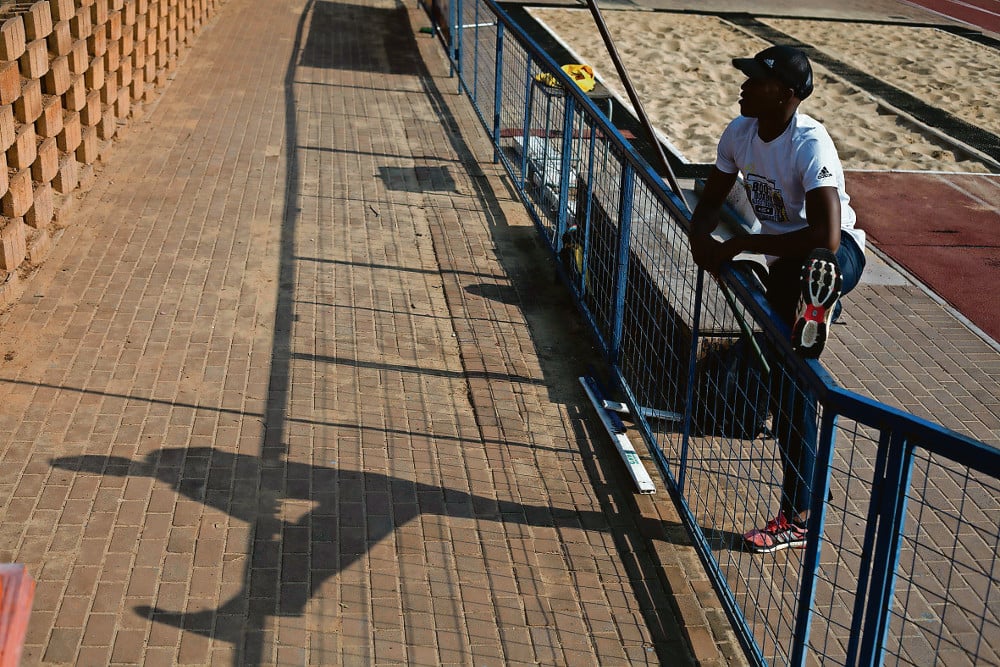
The natural long jumper has been training at the High Performance Centre in Pretoria. (Oupa Nkosi, M&G)
It helps, of course, that he’s jumping in the rarefied Highveld air, but he has lost none of his pace to the plate and none of the almost eerie poetry that sees him defy gravity for a special second as he flies. “I’m quick – I’m running the hundred metres in 10.4 but I want to get it down to maybe 10.1. or 10 flat,” he says. “I’m jumping 8.30 in takkies, so I can go further. And I’m 75kg now; I must get it down to something like 70kg. Then we can have a look.”
Whether by accident or design, Manyonga has found himself in the same off-campus house as Sizwe Ndlovu, the stroke in the men’s rowing team of lightweight coxless fours who won gold at the London Olympics. The two swap notes over a plate of food and chat – Manyonga laps it all up like a thirsty puppy. He looks up to the stroke as someone who has already gone to places where he wants to be, and everything he says is processed and filed away.
The coxless fours were not only remarkable for what they achieved three years ago but also for how they went about it, covering the second 1 000m of their 2 000m race faster than the first, a rare feat referred to as “negative splits” in rowing and athletics parlance.
“For me, rowing is as close as you get to death in sport,” says McGrath. “He [Sizwe] had great rhythm and kept that crew going brilliantly. He paced it so that they literally won on the line. I don’t know if you can talk about him having rhythm like that and him being a black guy? Is that racist? All I know is that the win was truly special.”
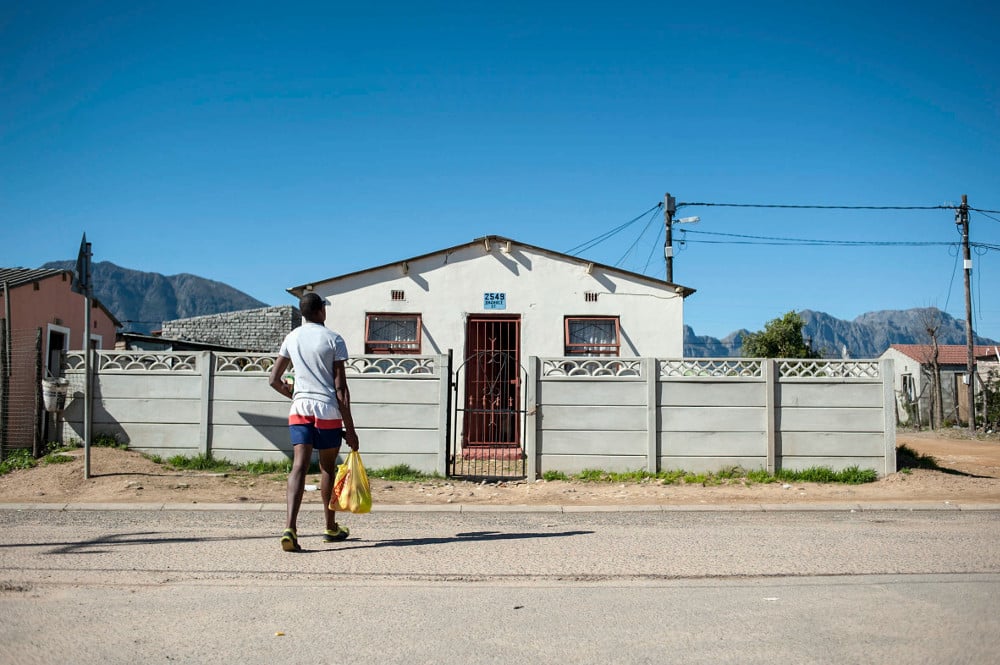
Manyonga is from Mbeweni outside of Paarl. He was banned for 18 months from competition in 2012 for the use of tik. His mentors were determined to get him away from there. (David Harrison, M&G)
For all that Manyonga has structure and direction, the feeling persists that each day is still a challenge to be hurdled. The terms of Sascoc’s largesse require him to have samples taken by a private doctor in Johannesburg twice a month and there are concerns that when he is forced to leave the Tukkies house in mid-December he might revert to his former ways. Manyonga’s having none of it. “I’m going to my sister in the rural Eastern Cape, the same place where I was initiated,” he says. “It’s far, far away. There I can be out of trouble.”
A clean Christmas is the way to go because 2016 is potentially the biggest year of Manyonga’s life. He’ll need to compete nationally, better the stipulated Olympic qualifying distance and spend at least some of the first half of the year campaigning overseas. In a sense, it’s pure foolhardiness that he’s even thinking about the Olympics, given that it represents an athletic challenge he has never seen the likes of before.
Then again, Manyonga isn’t your ordinary long jumper. Listening to what’s between the words is key when he talks because that is where you can glimpse the restless bubble of desire. McGrath sees it, and thinks Manyonga can stand on the Olympic podium; Manyonga sees it too, which wasn’t the case when things were getting cheap ‘n nasty a year ago.